Dogs naturally want to share food with their owners, however when it comes to fruit it is best to err on the side of caution. Certain fruits can be dangerous for dogs to eat, some work well as a healthy snack, while others are safe to consume but also come with side effects.
Newsweek asked canine experts what fruits can dogs eat - from bananas, blueberries, watermelon and more - as well as those that should be avoided.
Can Dogs Eat Fruit?
Speaking Newsweek, Dr. Jerry Klein, the chief veterinary officer at the American Kennel Club (AKC), explained typical symptoms that occur when a dog consumes fruits that pose a risk to their health include vomiting and diarrhea.
"In worse cases, such as cyanide poisoning, this could include difficulty breathing, dilated pupils, red gums or even kidney failure," Klein said. Cyanide can potentially be lethal if ingested in large enough amounts, the AKC notes.
Klein said: "Most of the fruit emergencies are rare...in our emergency room, we would see as many as 5-10 per week."
He warned owners should be careful with fruits that have pits, as "they can cause your pet to choke or obstruct their intestines, particularly plum and peach pits, which also contain poisonous cyanide."
Michael San Filippo, a spokesperson for the American Veterinary Medical Association (AVMA), told Newsweek it's important that fruits "are given in small, bite-sized portions, with the cores, stems, peels and seeds removed."
The AVMA spokesperson added fruits should only be given as "a special treat," as dogs get most of their nutritional needs from their regular diet.
If you believe your pet has been poisoned or eaten something they shouldn't have, call your veterinarian, local veterinary emergency clinic or the ASPCA Animal Poison Control Center immediately, the AVMA spokesperson said.

Below we take a closer look at different fruits your dog can and can't eat.
Bananas
Bananas, which are high in potassium, vitamin B6, vitamin C, as well as biotin and copper, are safe for dogs to eat. They are recommended by some veterinarians as a healthy alternative to fatty, salty treats for dogs, says the AKC.
However, owners should be careful of banana peels. The AKC says: "While the peels are not toxic to dogs, they are hard to digest and may cause a blockage.
"Even without the peel, feeding your pup too many bananas can cause stomach upset,"
Bananas should also only be given in moderation due to their high sugar content.
Apples
Apples are also safe for dog consumption and are a great source of vitamins A and C as well as fiber for your dog.
But owners be sure to remove the seeds and core before feeding them to dogs. They should also be given in moderation as overconsumption can cause some stomach-related issues.
The AKC explains: "Eating an excess of apples can lead to your dog experiencing a bellyache or diarrhea, so always serve them in moderation. Just an apple slice or two is enough to satisfy your dog's cravings."
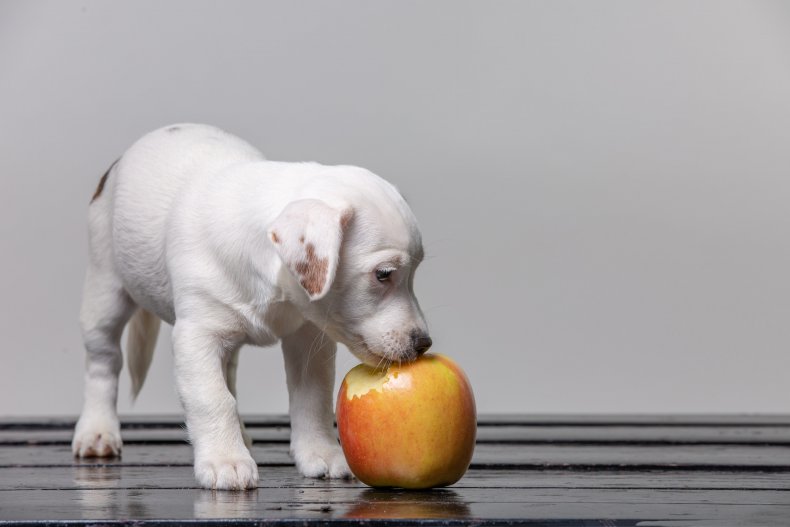
Strawberries
Packed with fiber, vitamin C and antioxidants, strawberries are safe and make healthy low-calorie snacks for dogs.
They are also a good source of potassium and manganese, which are crucial for supporting your dog's immune system, says the Blue Cross, a U.K. pet charity.
Strawberries also contain an enzyme that can help whiten your dog's teeth as they eat them, according to the AKC.
However, as with other fruits, they should be given in moderation due to their sugar content.

Can Dogs Eat Watermelon?
Watermelons are safe for dog consumption but the rind and seeds must be removed, as they can lead to intestinal blockage, the AKC warns.
Otherwise, the fruit is considered a "health-food powerhouse," packed with vitamin A, B6 and C, as well as potassium.
It's also a great way to keep your dog hydrated as the fruit is 92 percent water.
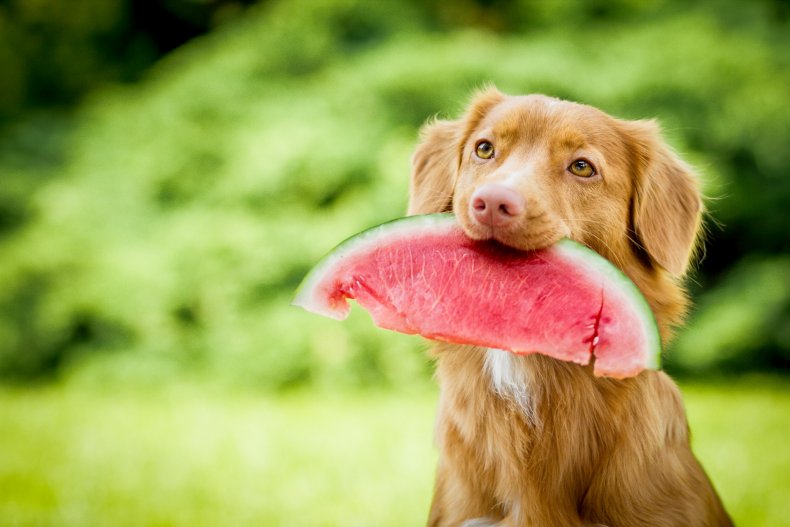
Blueberries
Rich in antioxidants, vitamin C and fiber, blueberries are safe for dogs to eat. Antioxidants help fight free radicals, which cause cellular and molecular damage in dogs as well as humans.
The AKC says: "As an added bonus, studies show that adding antioxidants to a dog's diet reduces the effects of brain aging, which is great if you have a senior dog."
Grapes
Speaking to Newsweek, Dr. Travis Arndt, the director of veterinary medicine at the Humane Society of Missouri (HSMO), said: "The most dangerous fruits for dogs' health are grapes and raisins. Researchers may have found that the tartaric acid in grapes and raisins is the substance which is harmful to dogs."
The AKC's Klein told Newsweek: "Grapes and raisins are some of the most common presentations to emergency clinics. It is very toxic to dogs and ingestion may potentially cause kidney damage within 48 hours."
Dogs often consume raisins by eating oatmeal raisin cookies or get into boxes of raisins, or a combination of chocolate and raisin cookies, Klein explained.
The AVMA spokesperson told Newsweek: "Even a small amount of grapes or raisins has the potential to cause kidney failure."
The Pet Poison Helpline, a national licensed animal poison center, explains: "All grapes and raisins, seeded and seedless, organic and conventionally grown, can cause toxicity. The exact way these foods cause toxicity is still unknown and toxicity does not necessarily appear to be dose-dependent."
Some of the common symptoms that indicate your dog has eaten a grape or raisin include the following, as outlined by the Blue Cross:
- Vomiting/diarrhea within two to three hours of eating grapes/raisins
- Tiredness/weakness
- Loss of appetite
- Seizures
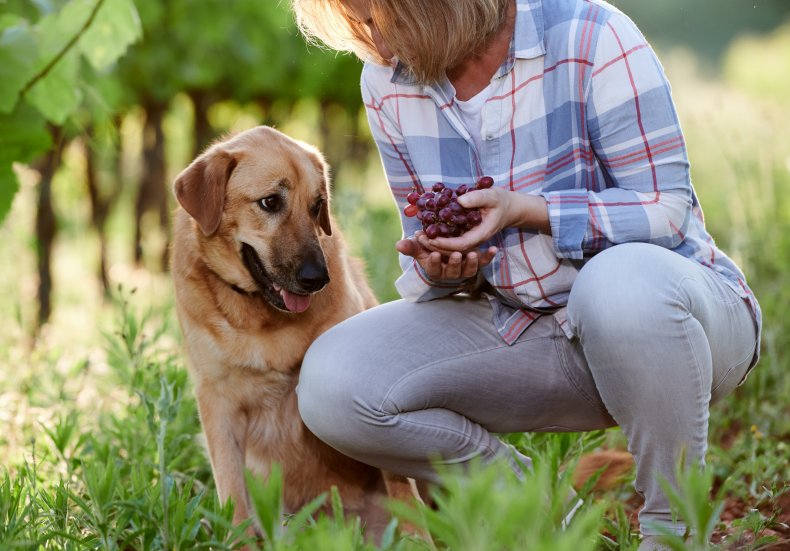
Can Dogs Eat Tomatoes?
Tomatoes are generally safe for dogs to eat but the leaves and green parts of tomato plants can be dangerous for dogs. For that reason, dogs should avoid eating tomatoes in moderate to large amounts, the AKC's Klein told Newsweek.
The Pet Poison Helpline explains the ripened fruit of the plant is considered non-toxic but its green parts contain solanine, which can "result in severe poisoning" when consumed in large amounts.
Consumption of these toxic parts can cause severe gastrointestinal distress (such as vomiting and diarrhea) as well as lethargy, weakness, and even confusion, according to the Pet Poison Helpline.
Below are some of the common signs that indicate your dog has eaten the leave or green parts of the tomato plant, as outlined by the AKC:
- Gastrointestinal upset
- Cardiac effects
- Loss of coordination
- Muscle weakness
- Tremors
- Seizures
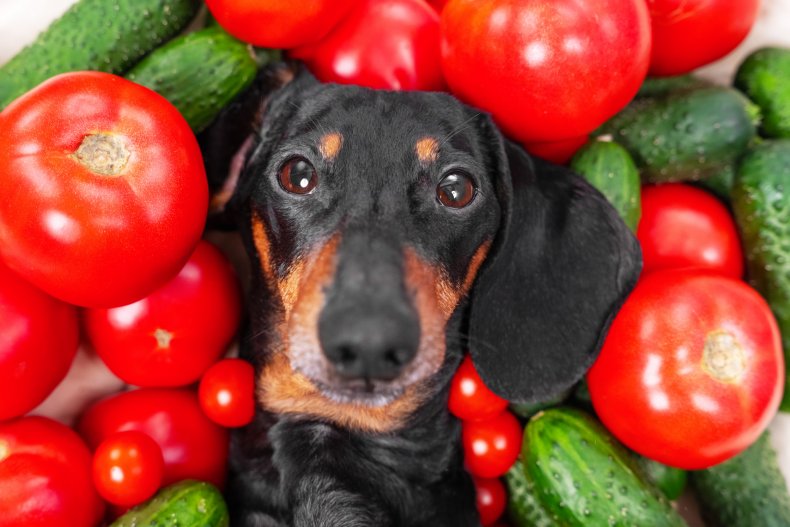
Oranges
Oranges are rich in vitamin C, potassium and fiber and are safe for dogs to eat in small quantities (one or two segments a day), according to the AKC.
But feeding your dog moderate to large amounts of citrus fruits, such as lemons and grapefruit, should also be avoided because it can cause gastroenteritis or stomach upset due to high acidity, the AKC's Klein told Newsweek.
Veterinarians recommend the peel and seeds be removed before feeding the flesh of the fruit to dogs, as they can cause stomach upset.
The AKC explains: "Orange peel is rough on their digestive systems, and the oils may make your dog literally turn up their sensitive nose.
"Orange peels are not toxic, however they can become lodged in your dog's digestive tract, causing an obstruction and requiring surgery to correct," it adds.
The ASPCA (American Society for the Prevention of Cruelty to Animals) also notes that varying amounts of citric acid and essential oils in citrus fruit as well as the stems, leaves, peels and seeds of citrus plants "can cause irritation and possibly even central nervous system depression if ingested in significant amounts.
"Small doses, such as eating the fruit, are not likely to present problems beyond minor stomach upset," the ASPCA says.
Can Dogs Eat Pineapple?
Full of nutrients, including vitamin C, thiamin, riboflavin, niacin, vitamin B6 and folate, pineapples are also safe for dogs to consume.
However, owners should stick to feeding dogs only the flesh of pineapples as their tough central core and spiny skin can cause obstructions if consumed.
The fruit is also high in fiber and is also high in sugar, so must be given in small quantities. Large amounts can potentially adversely affect the dog's digestive system.
"Keep an eye on your dog when you first feed him pineapple. If he has diarrhea or shows signs of an upset stomach, then pineapple might not be the fruit snack for him," the AKC advises.
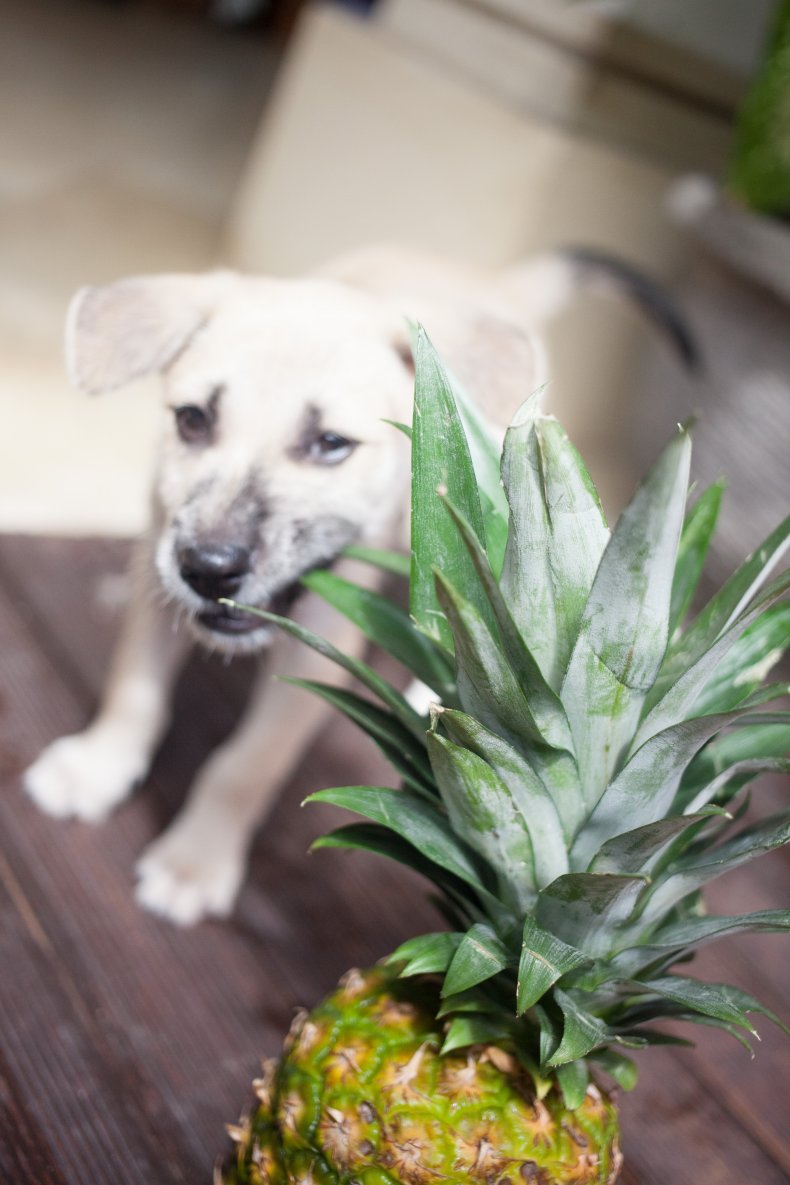
Cherries
The AKC's Klein told Newsweek: "Cherries should be avoided in moderate to large amounts because the plant itself contains cyanide. Cyanide can affect your dog's circulation, preventing their blood cells from getting enough oxygen."
The HSMO's Arndt told Newsweek cherries (as well as peaches, apricots, plums) have hard pits that present a possible choking and gastrointestinal obstruction hazard.
"Additionally, these pits also contain a sugar-cyanide compound called amygdalin which is toxic (although the fleshy parts of these fruits are generally fine for dogs to eat)," Arndt said.
Symptoms of cyanide poisoning in dogs include dilated pupils, difficulty breathing as well as red gums, the AKC says.

Coconut
Coconut and coconut-based products are "not likely to cause serious harm" to dogs when consumed in small amounts. However, the flesh and milk of fresh coconuts do contain oils that could cause "stomach upset, loose stools or diarrhea," the ASPCA says.
"Because of this, we encourage you to use caution when offering your pets these foods. Coconut water is high in potassium and should not be given to your pet," the ASPCA advises.
Can Dogs Eat Avocados?
The AKC's Klein told Newsweek dogs should avoid avocados because the pit, skin and leaves of avocados contain a toxic chemical known as persin. "Even the fleshy part of the fruit is not recommended for dogs to ingest," Klein warned.
The AVMA spokesperson told Newsweek: "Avocados can lead to upset stomachs and possibly serious health problems requiring immediate care."
It's unknown what amount of persin is lethal but large amounts can cause vomiting, diarrhea and myocardial damage (damage to the heart muscle), the AKC says.
The high fat content of the flesh can also cause an upset stomach, while its hard pit could also cause choking.
Peaches
The flesh of peaches, fed in small pieces, is safe for your dog to eat. But peach pits contain cyanide, which is poisonous for dogs.
The AKC warns: "Don't share canned or preserved peaches with your dog. They contain high amounts of sugar and may also be treated with preservatives or artificial sweeteners that can seriously upset your dog's digestive system."
Mango
Mangoes are also safe for dogs to eat and are great sources of vitamins A, B6, C and E.
The skin and pit of mangoes should be removed before feeding the fruit to dogs, as the skin can be difficult to digest, while the pit can be a potential choking hazard, the AKC warns.
As with several other fruits, it should be given in moderation to prevent any upset stomach or diarrhea.
Pears
Pears are also safe for dogs in bite-sized pieces. They are a good source of vitamin A and C as well as fiber.
The seeds of pears should be removed before feeding it to dogs, as they contain traces of cyanide, so they can be toxic if consumed in large quantities, the AKC warns.
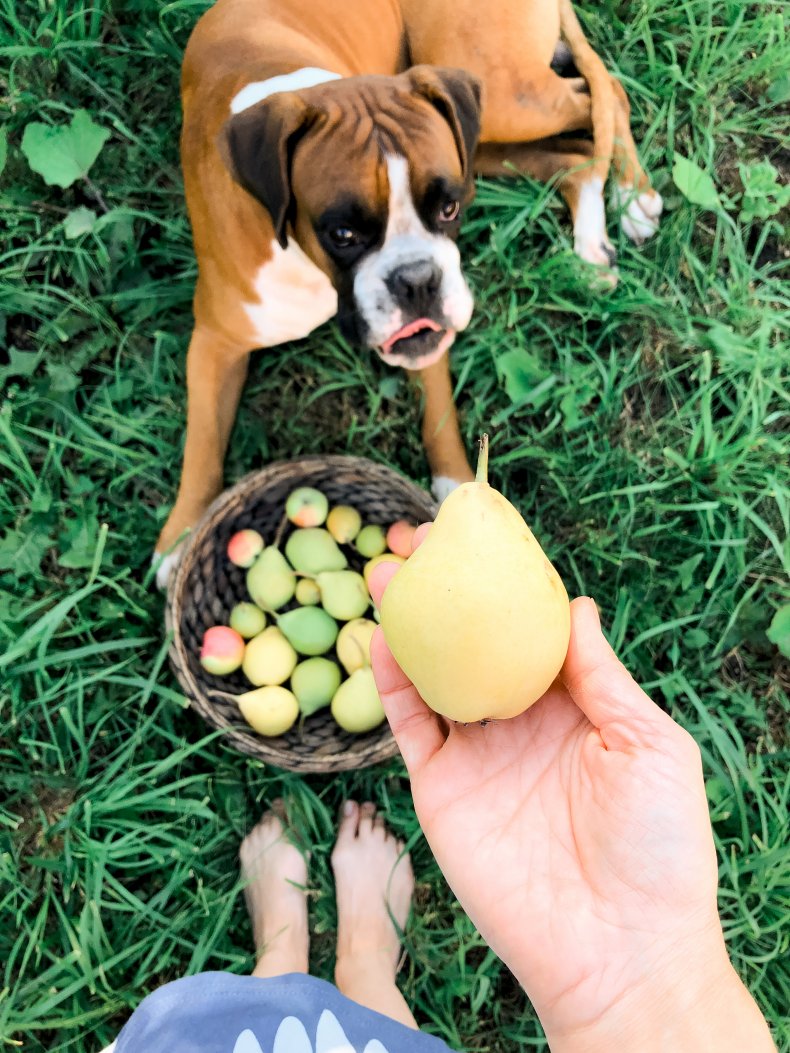
Raspberries
Dogs can consume raspberries, which are full of nutrients including Vitamin C, K, B-complex as well as potassium, manganese, copper, folic acid, iron and magnesium.
However, the AKC notes raspberries also contain one of the highest levels of natural xylitol, a natural sugar-free sweetener that is toxic to dogs.
The Pet Poison Helpline warns: "If enough xylitol is ingested it can cause life-threatening low blood sugar (even within 10-15 minutes of ingestion) and acute liver failure."
So raspberries should only be given in moderation.
Cranberries
Cranberries are safe for dog consumption but owners should be careful with dried cranberries, as some packages come mixed with other dried fruit, such as raisins, which are toxic for dogs.
Precautions should be taken with cranberry sauce as well because some recipes come with alcohol, which is also toxic for dogs, the AKC says.
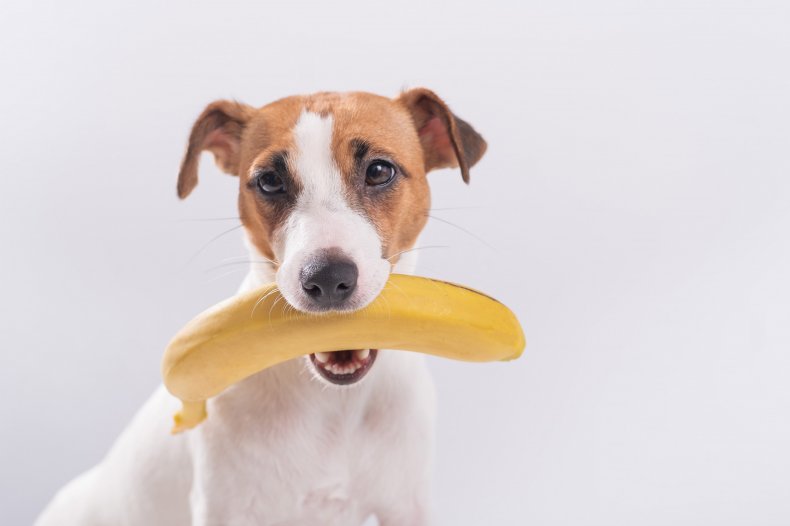
"eat" - Google News
September 11, 2021 at 08:05PM
https://ift.tt/392mxpX
Can Dogs Eat Bananas? All the Fruits Your Pooch Can (and Can't) Eat - Newsweek
"eat" - Google News
https://ift.tt/33WjFpI
https://ift.tt/2VWmZ3q
Bagikan Berita Ini














0 Response to "Can Dogs Eat Bananas? All the Fruits Your Pooch Can (and Can't) Eat - Newsweek"
Post a Comment